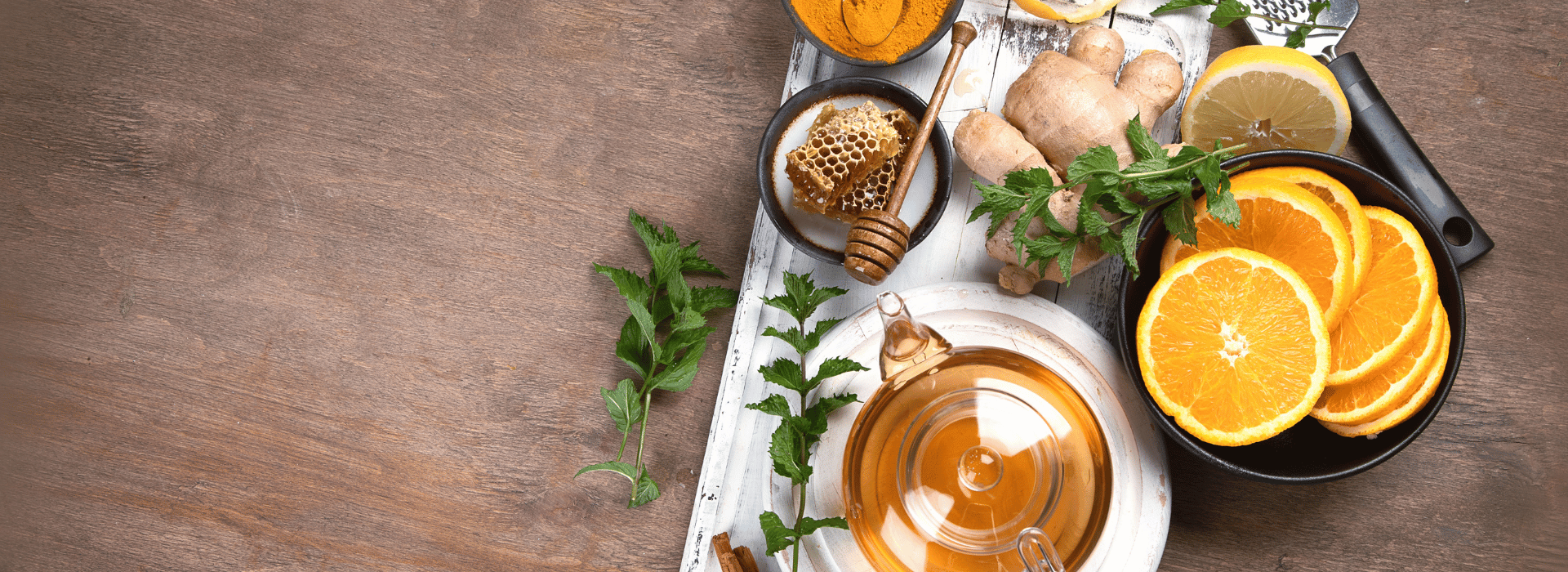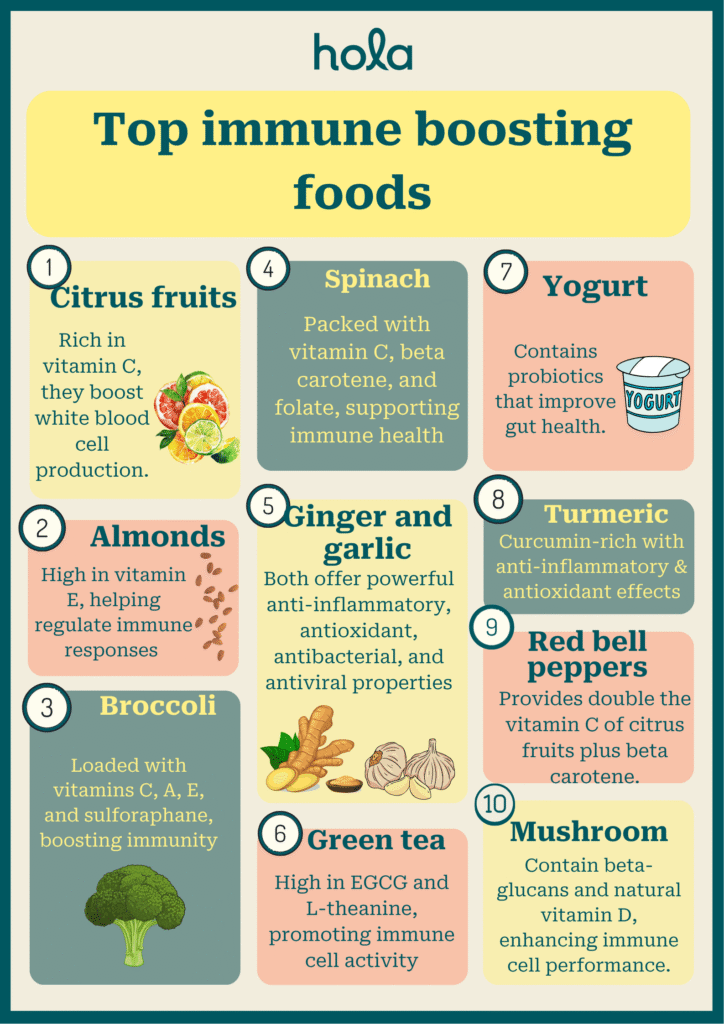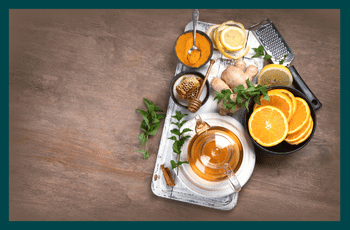11 foods that boost the immune system to fight off the flu
Written by the editorial staff writer at Hola. Medically Reviewed by Dr. Ammar AL-ANI, MBChB, CCBST, AMC.

Contents

Summary: Boosting your immune system with foods like citrus fruits, spinach, ginger, garlic, yoghurt, and green tea can help fight the flu. These nutrient-rich choices offer vital vitamins, antioxidants, and probiotics that support the immune system and reduce inflammation. A balanced diet can fortify your body’s defences and keep you healthy during flu season.
The flu season is here, and let’s face it—no one wants to be bedridden, feeling miserable. In fact, Australia recorded 46,300 lab-confirmed influenza cases between January and March, making a more than 50% increase from last year. But what if you could boost your immune system like a superhero? Good news—you absolutely can! By munching on some tasty, nutrient-rich foods, you can strengthen your body to fight those harmful germs. Ready to learn what foods can help you stay strong and flu-free? Let’s dive in!
What are superfoods?
Superfoods are highly nutritious foods that provide numerous health benefits. They are abundant in vitamins, minerals, antioxidants, and other vital nutrients that improve overall health, strengthen the immune system, and decrease the risk of long-term health conditions. Examples of superfoods include leafy vegetables, berries, nuts, seeds, avocados, and salmon. These foods are considered “super” for their extraordinary health benefits and low calorie content.Feeling sick and unsure why? Speak with a GP online in 15 minutes.
Top 11 immune-boosting foods
Immune-boosting foods are those packed with vitamins, minerals, antioxidants, and other nutrients that support and enhance the body’s immune system. Here are some of the top immune-boosting foods:Citrus fruits:
Citrus fruits like oranges, grapefruits, tangerines, lemons, and limes are well-known for their high vitamin C levels. Vitamin C plays a crucial role in boosting the production of white blood cells, which are critical for combating infections. The white blood cells help detect and neutralise pathogens, including the flu virus. Moreover, vitamin C acts as an antioxidant, safeguarding the immune system from damage caused by harmful molecules called free radicals. Eating a variety of citrus fruits can support healthy immune system function, particularly during the flu season.Spinach:
Spinach is rich in vitamins and minerals, particularly vitamin C, beta carotene, and folate. These nutrients are vital for maintaining a healthy immune system. Vitamin C aids in white blood cell production, while beta carotene, converted into vitamin A, strengthens the immune system response. Spinach also contains a wealth of antioxidants, which help combat oxidative damage and inflammation. Adding spinach to your diet can enhance immune health and overall vitalityYoghurt:
Yoghurt, especially the varieties with live and active cultures (probiotics), is essential for maintaining a healthy gut microbiome. A significant part if the immune system resides in the gut, where beneficial bacteria help regulate immune responses. The probiotics in yoghurt promote gut health, increase the production of immune cells, and protect the body against harmful microorganisms. Regular consumption of yoghurt can support immune function and promote overall health during the flu season.Ginger:
Ginger is another powerful food that can help strengthen the immune system. It contains natural anti-inflammatory and antioxidant properties that can reduce inflammation in the body, which often increases during an infection. Ginger also supports digestion, soothes sore throats, reduces nausea, and helps with common flu symptoms. Additionally, ginger stimulates the immune system, making it a valuable food for fighting viruses like the flu.Garlic:
Garlic has been valued for centuries for its medicinal properties. It contains compounds like allicin, which have natural antibacterial and antiviral properties that help fight infections. Garlic can also strengthen the immune system’s ability to fight infections by stimulating white blood cell activity and promoting the production of immune-boosting proteins. Including garlic in your diet can help protect the body against the flu virus.Almonds:
Almonds are an excellent source of vitamin E, a fat-soluble antioxidant that plays a key role in supporting immune health. Vitamin E helps control immune cell activity and shields cells from damage caused by oxidative stress. It also enhances the body’s ability to fight infections by optimising the immune response. Enjoying a handful of almonds or incorporating them into your meals can give your body a valuable boost during the flu season.Broccoli:
Broccoli is a rich source of vitamins C, A, and E, along with fibre and antioxidants. Vitamin C, a vital nutrient for boosting immunity, helps protect the body from infections. Moreover, broccoli contains sulforaphane, a compound that supports immune system function and reduces inflammation. Eating broccoli regularly provides essential nutrients that boost your body’s defences against the flu and other illnesses.Turmeric:
Turmeric is a vibrant spice celebrated for its anti-inflammatory and antioxidant abilities, attributed to curcumin. It regulates the immune system and might boost antibody responses. Combine it with black pepper to enhance absorption.Green tea:
Green tea boasts a high concentration of antioxidants, notably EGCG, which improves immune function. It also has L-theanine, an amino acid that promotes T-cell activity. Consuming it regularly provides gentle yet effective support for the immune system.Red bell pepper:
Red bell peppers are packed with vitamin C, over twice the amount in citrus fruits. They are also abundant in beta carotene, which contributes to skin and eye health. Add them raw to salads or lightly roast them for immune-boosting advantages.Mushrooms:
Mushrooms such as shiitake, maitake, and reishi feature beta-glucans that enhance immune cell performance. They also naturally provide vitamin D, particularly when exposed to sunlight. Incorporating them into your meals can help the body fend off infections. Integrating a range of immune-supportive foods into your daily meals can bolster your body's natural defenses. From antioxidant-laden fruits and vegetables to spices and probiotics, minor dietary choices can create significant impacts.
Other ways to boost the immune system naturally
Supporting your immune system doesn’t necessitate elaborate supplements. Simple daily practices can yield considerable benefits:- Consume a nutrient-rich diet: Focus on abundant fruits, vegetables, whole grains, lean proteins, and healthy fats to provide vital vitamins such as C, D, and zinc.
- Keep active: Engaging in regular exercise like walking, yoga, or cycling. Keeping active enhances circulation and immune cell functionality.
- Ensure adequate sleep: Aim for 7–9 hours each night to enable your body to repair and bolster immunity.
- Stay hydrated and handle stress: Drink sufficient water and engage in meditation or deep breathing exercises to alleviate stress-induced inflammation.
- Practise good hygiene: Wash your hands frequently and avoid close contact with sick individuals.
Also read: Weak immune system: Symptoms & GP approved tips
How can you boost your immune system quickly?
To provide your immune system with a quick boost, start by drinking enough water and consuming nutrient-rich foods high in vitamin C, zinc, and antioxidants like citrus fruits, berries, garlic, and leafy greens. Aim for 7–9 hours of restful sleep, participate in light exercise to improve circulation, and manage stress through deep breathing or meditation. If you're feeling fatigued, incorporating a short-term vitamin C or zinc supplement might be beneficial. Avoid alcohol, sugar, and smoking, as they can hinder immune functionality. While there's no quick solution, these healthy practices can effectively support your body's natural defences.
Also read: Immune system check: How to tell if your immune system is weak?
How do you increase white blood cell count?
White blood cells (WBCs) are crucial in protecting your body against infections and diseases. If your WBC count is low, your immune system might be compromised, making it challenging to combat germs. Luckily, numerous natural lifestyle changes can help boost and maintain your white blood cell count efficiently:
- Balanced nutrition: Incorporating foods rich in immune-enhancing nutrients such as vitamin C, zinc, folate, and protein can foster white blood cell production. Include citrus fruits, leafy greens, lean meats, eggs, legumes, and nuts in your meals.
- Sleep and rest: Sufficient sleep is essential for your body to heal and produce immune cells, especially white blood cells.
- Physical activity: Engaging in moderate exercise enhances circulation and supports the movement of immune cells. Refrain from overexertion, as it can lead to decreased WBC counts.
- Stress management: Ongoing stress can weaken the immune system. Consider practices like deep breathing, yoga, meditation, or journaling to effectively manage stress.
- Lifestyle choices: Avoid smoking and restrict alcohol consumption, as both can adversely affect immune function and lower white blood cell production.
A healthy lifestyle with proper nutrition, rest, exercise, and stress control can help naturally increase your white blood cell count. If issues persist, consult a healthcare provider for further evaluation.
What foods help fight viruses?
A robust immune system begins with your diet. Certain foods are loaded with nutrients that help your body naturally combat infections and recover more quickly.
- Citrus fruits: Citrus fruits such as oranges, lemons, and grapefruits are high in vitamin C, which boosts white blood cell production, a critical factor in fighting infections.
- Garlic: Garlic is rich in allicin, a compound recognised for its antimicrobial and immune-supportive benefits, making it an effective ally against infections.
- Ginger: Ginger offers anti-inflammatory and antioxidant properties that can assist in alleviating symptoms related to infections and aid in recovery.
- Yoghurt and fermented foods: These are rich in probiotics, enhancing gut health and fortifying your immune system.
- Leafy greens: Greens like spinach and kale are abundant in vitamins A, C, and E, all crucial for maintaining immune health.
- Nuts and seeds: Almonds, sunflower seeds, and walnuts are sources of vitamin E and zinc essential for immune cells' function.
Incorporating these foods into your daily meals can bolster your immune system and enhance your protection against infections.
What foods help fight infections?
Your nutrition significantly influences the effectiveness of your immune system in warding off infections. Certain foods are rich in nutrients that support healing and maintain strength.
- Citrus fruits: Fruits like oranges, lemons, and grapefruits are high in vitamin C, which aids in the production of white blood cells and enhances immunity.
- Garlic and ginger: Garlic possesses antimicrobial properties, while ginger provides anti-inflammatory advantages—both assist your body in combating illness.
- Leafy greens and vegetables: Vegetables such as spinach, kale, and bell peppers are loaded with vitamins A, C, and E, all essential for optimal immune system performance.
- Yoghurt and fermented foods: The probiotics found in yoghurt and fermented foods promote gut health, which is closely linked to immune resilience.
Consuming nutrient-rich foods daily can help your body naturally avert and combat infections.
See a doctor online to get medical advice
How do you increase white blood cell count?
White blood cells (WBCs) are crucial in protecting your body against infections and diseases. If your WBC count is low, your immune system might be compromised, making it challenging to combat germs. Luckily, numerous natural lifestyle changes can help boost and maintain your white blood cell count efficiently:- Balanced nutrition: Incorporating foods rich in immune-enhancing nutrients such as vitamin C, zinc, folate, and protein can foster white blood cell production. Include citrus fruits, leafy greens, lean meats, eggs, legumes, and nuts in your meals.
- Sleep and rest: Sufficient sleep is essential for your body to heal and produce immune cells, especially white blood cells.
- Physical activity: Engaging in moderate exercise enhances circulation and supports the movement of immune cells. Refrain from overexertion, as it can lead to decreased WBC counts.
- Stress management: Ongoing stress can weaken the immune system. Consider practices like deep breathing, yoga, meditation, or journaling to effectively manage stress.
- Lifestyle choices: Avoid smoking and restrict alcohol consumption, as both can adversely affect immune function and lower white blood cell production.
What foods help fight viruses?
A robust immune system begins with your diet. Certain foods are loaded with nutrients that help your body naturally combat infections and recover more quickly.- Citrus fruits: Citrus fruits such as oranges, lemons, and grapefruits are high in vitamin C, which boosts white blood cell production, a critical factor in fighting infections.
- Garlic: Garlic is rich in allicin, a compound recognised for its antimicrobial and immune-supportive benefits, making it an effective ally against infections.
- Ginger: Ginger offers anti-inflammatory and antioxidant properties that can assist in alleviating symptoms related to infections and aid in recovery.
- Yoghurt and fermented foods: These are rich in probiotics, enhancing gut health and fortifying your immune system.
- Leafy greens: Greens like spinach and kale are abundant in vitamins A, C, and E, all crucial for maintaining immune health.
- Nuts and seeds: Almonds, sunflower seeds, and walnuts are sources of vitamin E and zinc essential for immune cells' function.
What foods help fight infections?
Your nutrition significantly influences the effectiveness of your immune system in warding off infections. Certain foods are rich in nutrients that support healing and maintain strength.- Citrus fruits: Fruits like oranges, lemons, and grapefruits are high in vitamin C, which aids in the production of white blood cells and enhances immunity.
- Garlic and ginger: Garlic possesses antimicrobial properties, while ginger provides anti-inflammatory advantages—both assist your body in combating illness.
- Leafy greens and vegetables: Vegetables such as spinach, kale, and bell peppers are loaded with vitamins A, C, and E, all essential for optimal immune system performance.
- Yoghurt and fermented foods: The probiotics found in yoghurt and fermented foods promote gut health, which is closely linked to immune resilience.
See a doctor online to get medical advice
If you are feeling unwell, experiencing recurring symptoms, or simply require expert advice, consulting a doctor online is a quick and convenient solution. Telehealth platforms offer the ability to connect with licensed doctors from the comfort of your home, eliminating wait times and lengthy commutes. Whether you seek guidance, a diagnosis, instant scripts, or referrals, online consultations can deliver prompt and trustworthy medical assistance. Many services provide same-day appointments, and you can often communicate with a doctor in under 15 minutes. This approach is particularly suitable for non-emergency issues such as infections, skin conditions, cold and flu symptoms, or ongoing health management. For swift, professional care, consider scheduling a virtual appointment with a reliable provider like Hola Health.
So, there you have it! By incorporating these immune-enhancing foods into your diet, you are giving your body the resources it needs to combat the flu like a pro. Stay strong, stay well, and let your meals be your first line of defence this season!
Need time off to recover? Get your medical certificate online within 15 minutes.
What we treat
- Cough
- Nausea & vomiting
- Fever
- Hayfever
- Fatigue
- Sore throat
- Acne
- Hair loss
- Gout
- Eczema
- Rosacea
- Sunburn
- UTI
- Erectile dysfunction
- Contraception
- Morning sickness
- Morning after pill
- Prostate health
- Anxiety
- Depression
- Stress
- Grief & loss
- Antidepressants
- Premature ejaculation
- Asthma
- Blood pressure
- Blood thinners
- Diabetes
- Cholesterol
- Migraines & headaches
- Allergies
- Body ache
- Heartburn & reflux
- Sleep disorder
- Pain relief
- Gastro
Related Articles
Disclaimer
This blog is for general informational purposes only and does not indicate that Hola Health provides all treatments or preventive measures mentioned. It is not intended to be a substitute for professional medical advice. Always seek the guidance of your doctor or other qualified health professional with any questions you may have regarding your health or a medical condition. For emergencies please immediately contact 000. Any medical topics discussed are intended to educate, not to imply availability through Hola Health.

Get affordable healthcare on your terms, with quick access to qualified, Australian-registered telehealth doctors & health practitioners, 24/7, 365 days a year. No more searching for ‘doctors near me‘ – Hola connects you instantly.
Address: 79 St Georges Terrace, Perth WA 6000


Hola Health App
Get affordable healthcare on your terms, with quick access to qualified, Australian-registered telehealth doctors & health practitioners, 24/7, 365 days a year. No more searching for ‘doctors near me‘ – Hola connects you instantly.
Call 000 for emergency or urgent medical help.
Address: 79 St Georges Terrace, Perth WA 6000
© Hola Health, a brand of Packapill Pvt Ltd


 Facebook
Facebook  X
X  Copy Link
Copy Link











